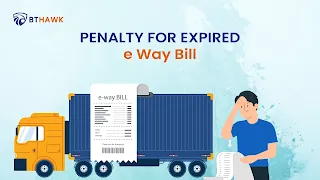Penalty For Expired E Way Bill
In India, when you want to move goods and pay taxes, this is a very important document. It was introduced as part of the Goods and Services Tax (GST) system to make sure that there is control over the movement of things within the country so that people do not escape paying taxes.
If one is moving something between states in India, this small paper can be very critical. But then what happens whenever it lapses? This article provides insight into the consequences of having an expired e-way bill and how to avoid them.
Importance Of E-way Bill?
There are many reasons why the e-Way Bill is essential. To begin with, It acts as a way to streamline logistics through its use by all parties concerned. Two, it ensures adherence to Goods and Services Tax (GST) regulations which helps in the easy identification of products by government officials and thus proper taxation.
Validity Of E-way Bill?
How long an e-Way Bill is good for depends on how far the things need to go. For example, a distance of up to 100 km is good for one day, and each extra 100 km adds another day. Making sure that your e-Way Bill is good for the whole trip is very important.
Penalty For Expired E-Way Bill?
If a person has an outdated e-Way Bill in India, then he or she should expect to face several penalties under the GST (Goods and Services Tax) law. This article details all of these penalties and what will follow:
1. Monetary Penalties:
For Transporters and Owners: Avoidance of any kind of punishment depends upon being careful. When generating the e-Way Bill ensure that the information entered is accurate. Ensure you keep checking your e-Way bills’ status regularly and extend them when necessary.
For Evasion of Tax: Authorities can fine up to 100% of the tax amount if they find out that there was a plan to avoid paying it.
2. Detention And Seizure:
The goods and the vehicle carrying them can be taken by the police if the e-Way Bill is invalid.
The goods will not be released until the tax and penalty are paid in full.
3. Applicable GST Rules:
Section 129 of the CGST Act, 2017 says that things that are transported against the law can be held or taken away.
The owner of the goods can pay the fine and tax, which is the full amount of tax that should be paid on those 100% goods, to get them back.
The owner of the goods can also put up a bond and protection equal to the amount that needs to be paid.
4. Interest On Tax Liability:
A penalty may be added to the missing tax amount, and interest at the rate of 18% per year may be charged from the due date until the payment date.
5. Legal Consequences:
Repeatedly not following the rules can lead to the GST authorities being more careful and keeping a closer eye on things.
People who break the law often could be taken to court, which could lead to harsher punishments and fines.




Comments
Post a Comment